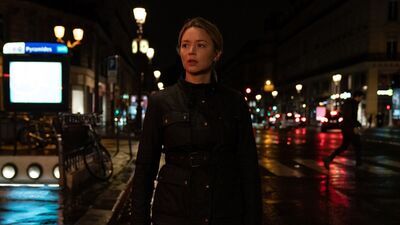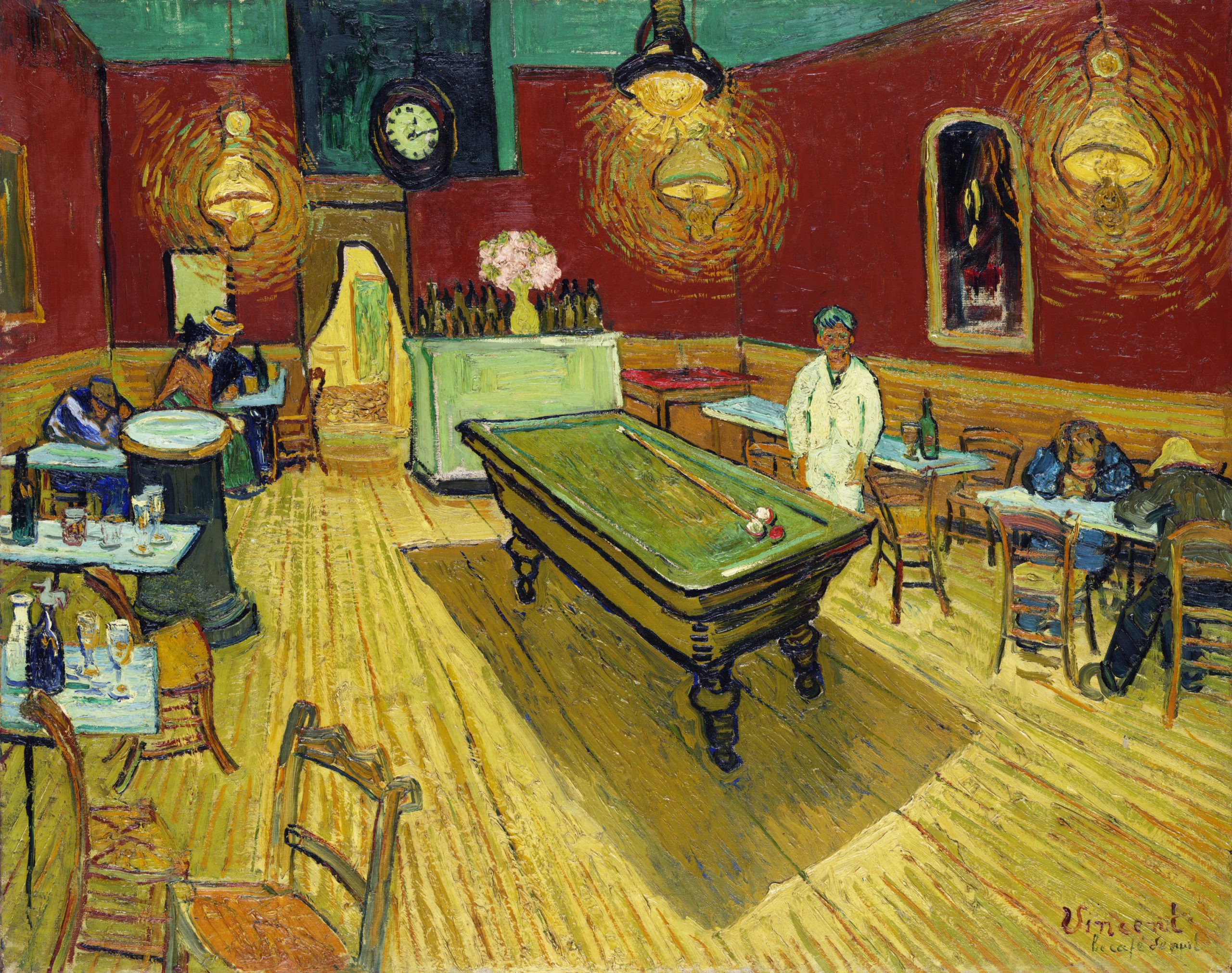
Francophiles rejoice, for “Rendez-Vous with French Cinema,” an annual snapshot of what’s going on in the world of contemporary French filmmaking, is returning to New York’s Walter Reade Theater for its 28th edition. As in years past, the 21 films here cover a wide variety of genres and feature the best working behind the camera in French cinema today, as well as the intriguing debut efforts from a number of up-and-comers. In addition, many of the titles featured here have scored major victories on both the international awards circuit and France’s César Awards, which were presented just that week. If that weren’t inducement enough, certan screenings will be accompanied by post-screening Q&As with the filmmakers. There will also be on-stage discussions that will be open to the public.
For example, one of the most celebrated actresses working in France today, Virginie Efira, will be on hand to participate in one of the discussions and present two films in which she stars, including this year’s Opening Night selection, “Revoir Paris” (March 3), the latest work from celebrated director Alice Winocour (who will also be on hand at the screening). In this quietly harrowing drama, Efira plays Mia, a woman whose perfectly ordinary life is shattered forever when the Paris restaurant she is dining at one night is the target of a mass shooting. Although her physical injuries are easily treatable, the emotional scarring she suffers as a result is considerable and results in a near-total blackout of what occurred that fateful night. Increasingly alienated from her husband, who wasn’t there, she’s determined to reconstruct exactly what happened as a way of possibly finding closure to such an unthinkable, if increasingly common, traumatic event. However, instead of lingering on the grisly details, Winocour is more interested in observing Mia as she tries to get to the bottom of what happened to her that night, bonding with fellow survivors. The results are both gripping and quietly moving, as is Efira’s wonderful performance (which earned her the César for Best Actress). The end is a bit wobbly—without going into too much detail, it flirts with a particularly groan-worthy cinematic trope—but overall, this is a stunning examination of grief and recovery that will haunt you long after it is over.
Efira will also be on hand with director Rebecca Zlotowski to present “Other People’s Children” (March 3 and 12), a somewhat lighter, if ultimately no less serious-minded contemporary drama that’s like a throwback to ’70s-era feminist narratives like “An Unmarried Woman.” This time around, Efira plays Rachel, a schoolteacher who seems completely satisfied with her life but is becoming increasingly aware that the time frame for having the biological child that she clearly desires is growing short. (In one of the more delightfully odd cameos in recent memory, her gynecologist is played by none other than the legendary Frederick Wiseman.) She soon begins dating car designer Ali (Roschdy Zem), who takes a while to reveal that he’s the father of 4 1/2-year-old daughter Leila (Callie Ferreira-Goncalves). When she finally meets the kid, she quickly grows to adore her.
However, there are still tensions underneath, primarily about Rachel’s awareness that for as much as she loves Leila, she is not her mother (who is played by Chiara Mastroianni). And her entire relationship with the kid is dependent on her relationship with Ali, which could theoretically change at any point. Using rom-com tropes in knowing ways, Zlotowski presents a smart and compelling observation of adult-child relationships and societal pressures on middle-aged women without being overly didactic. Efira is alternately strong and charming here, and on top of her work in “Paris Memories,” will give viewers additional proof as to her range and gifts as an actress.
Also on hand at the festival is the big winner of last week’s Césars, Dominik Moll’s “The Night of the 12th” (March 7 and 10), which went into the ceremony with ten nominations and came away with six wins, including Best Picture, Best Director and Best Adapted Screenplay. The movie is adapted from a section of 18.3, Pauline Guena’s look at a year of French murder investigations that was inspired in part by David Simon’s Homicide: A Year on the Streets. But it will no doubt inspire more comparisons to David Fincher’s “Zodiac” as it begins with the brutal murder of a young woman after leaving a party and follows two police investigators—the idealistic Yohan (Bastien Bouillon, who won the Most Promising Actor prize) and the older and more hotheaded Marceau (Best Supporting Actor winner Bouli Lanners)—as they pursue a number of leads. Although known for his diabolically clever and darkly funny past thrillers, Moll (who will be at the screening on the 10th) proves to be just as adept with the sober docu-drama style approach he utilizes here. He also does an effective job of highlighting the misogyny of contemporary society and how it touches everything from a woman whose life is cut short for no evident reason to an investigatory bias that’s more about uncovering the private lives of female victims than uncovering the identities of their attackers.

A grisly murder investigation and an examination of misogynistic attitudes are also at the center of “Saturn Bowling” (March 5 and 6), the brutal new psychodrama from Patricia Mazuy. In this one, police detective Guillaume (Arieh Worthalter) tries to mend fences with his estranged half-brother, Armand (Achille Reggiani), following the recent death of their father by passing on the family bowling alley that was left to him in the will. Instead of settling things, Armand’s hothead behavior towards the bowling alley and its regulars only serves to increase tensions, and Guillaume is pushed even further to distraction by a series of murders of young women in the area that force him to consider the unthinkable.
This is a tense, well-made, and well-acted film. It works as both a crime story and a family drama, but it bears noting that this one is exceptionally grim. There is one extended sequence, in particular, depicting the graphic sexual assault and murder of a young woman that’s so intense and unsparing that it will remind many viewers of the equally excruciating rape scene in “Irreversible.” Thankfully the rest of the film is not nearly as graphic (though not exactly a walk in the park), and those not sent running into aisles by it will be rewarded with a stark and fascinating example of neo-noir cinema.
On a much lighter note, Louis Garrel’s “The Innocent” (March 4 and 8) found itself up for 11 César Awards and earned two, including an Original Screenplay prize for Garrel and co-writers Tanguy Viel and Naila Guiguet. Here, Garrel (who will be at the screening on the 4th) plays Abel, a young man still reeling from the death of his wife when he discovers that his mother (Anouk Grinberg), who teaches theatre classes at a local prison, is going to marry one of her students, Michel (Roschdy Zem), and open a flower store with him after his imminent release. Worried about his mother and suspicious of his new stepfather’s motivations, he and Clemence (Noemie Merlant), his late wife’s best friend, begin a theoretically clandestine investigation of what Michel is up to.
Although the film does try to probe the nature of relationships between parents and their adult children, its majority is dedicated to silliness involving Abel’s attempts to prove his suspicions and the eventual heist. The film threatens to become too twee for its own good but is rescued by Merlant’s performance (which won her a Best Supporting Actress award). She is especially hilarious during an extended sequence in which she is forced to single-handedly keep the unfolding crime from flying off the rails.

Garrel will also be around to introduce “The Plough” (March 4 and 12), the latest film from his father, Philippe Garrel, in which he co-stars with his sisters Esther and Lena. The three play the children of Simon (Aurelien Recoing), and all four work as part of a troupe of puppeteers along with apprentice Peter (Damien Mongin). When Simon passes away—in the midst of a performance, no less—his children, along with Peter, struggle to keep things going on as a tribute to him. But a series of deaths, disasters, and romantic disputes, along with Peter’s increasing emotional instability, threaten to bring the whole enterprise to an ignominious end. Although the interplay between the Garrels lends an emotional immediacy to the proceedings, the various plot developments feel more contrived than convincing.
That said, as behind-the-scenes looks at theatrical groups inspired by real life and featuring Louis and Lena Garrel that appear in this year’s lineup go, it’s certainly preferable to “Forever Young” (March 5 and 10), Valeria Bruni Tedeschi’s increasingly tedious film inspired by her days in the late 1980s at Les Armandiers, a famed French theater school that counted filmmaker Patrice Chereau (played here by Louis Garrel) as one of its directors. As it charts the misadventures of a group of students over the course of the year (including one played by Nadia Tereszkiewicz, who won the Most Promising Actress César), we see them confronting drugs, bad relationships, the specter of AIDS, jealousy, and the like. But we get absolutely no sense of how any of them or growing and developing as artists. Because of the subject, this film will no doubt find itself compared to “Fame” (1980) but trust me, it hardly derives to be compared to the remake you have long since forgotten about, let alone the original.
More engaging observations of young people delving into the performing arts come in the form of Ramzi Ben Sliman’s “Neneh Superstar” (March 7 and 9) and Lise Akoka and Romane Gueret’s “The Worst Ones” (March 5 and 7). In the former, a spunky 12-year-old Black girl named Neneh (Oumy Bruni Garrel—the daughter of Louis Garrel and Valeria Bruni Tedeschi) yearns to study ballet at a prestigious boarding school. But she finds her presence is an unwanted distraction to many of the instructors who want to uphold the “traditions” they have followed so long—a barely disguised way of saying that they don’t want Black dancers in the ensemble. Neneh’s chief opponent is the head teacher and famed dancer Marianne Bellage (Maïwenn), who wants the girl gone for reasons that might have to do with a shocking secret she has been carrying since her own days on stage. Like most of the plot developments here, that secret is not exactly startling, but what the film lacks in novelty, Sliman (who will attend the March 7 screening) more than makes up for with its undeniably crowd-pleasing tone. The film also has a spectacularly winning performance from Garrel as Neneh, who is wonderfully energetic and engaging both as a dance and as a presence.
In “The Worst Ones” (which won the Un Certain Regard prize at Cannes last year), filmmaker Gabriel (Johan Heldenbergh) is preparing his new project, a drama about a group of kids living in an impoverished neighborhood that is clearly inspired by the works of Larry Clark and the Dardennes, and is destined to one day be described as “searing” in a festival program. Like those cited filmmakers, Gabriel decides that the best way to achieve his realism is casting a group of non-professional kids from the lower-class neighborhood where he is filming. While Gabriel attempts to capture his version of reality, the kids undergo their own various struggles (including the lead girl falling for a much older crew member and a brash guy constantly boasting about his sexual prowess, practically wilting away when it comes time to shoot the big sex scene). Meanwhile, the locals become increasingly annoyed with the whole thing, partly for the constant disruptions and partly for how their efforts to make their community more appealing could be undone by how Gabriel plans to depict them. Although there may be a few more plot threads than Akoka and Gueret (who will be on hand on the 5th) can satisfactorily resolve, their observations on this style of filmmaking and the ways art and exploitation can get blurred are reasonably provocative and often quite funny as well.

Two other films in the lineup pay overt homages to the cinematic legacies of two great filmmakers, one of them far more successfully than the other. “The Green Perfume” (March 8 and 11), the new movie from Nicolas Pariser (who will attend on the 8th), opens with a performance at the Comedie-Francaise that’s interrupted by the on-stage death of one of the actors, who whispers “green perfume” to co-star Martin (Vincent Lacoste) before expiring. Befitting the Alfred Hitchcock comic thrillers that are its clear inspiration, Martin is mistaken for the killer and goes off on a trip through Brussels and Budapest, accompanied by bored comic book writer Claire (Sandrine Kiberlain). The two try to figure out who did it and why, while being pursued by the police and other unknown forces. Although the film could not possibly be more inessential—at times, it seems to dissolve right before your eyes—it does have a certain charm to it. As a knowing take on Hitchcock’s lighter works, it’s an easy watch.
Emmanuel Mouret’s “Diary of a Fleeting Affair” (March 3 and 6), however, is an astonishingly tedious work that tries to evoke the spirit of Woody Allen with its tale of a single mother (Kiberlain again) and a married man (Vincent Macaigne). The two set off on what they initially promise will be a purely sexual relationship with no other future, only to find their feelings and attitudes changing through the course of their liaison. Mouret is clearly trying to pay homage to the likes of “Annie Hall” and “Manhattan” but does it so badly—the characters are uninteresting throughout, their observations are shallow and contrived and their jokes stink—that they make even Allen’s late-period duds feel like founts of pure inspiration by comparison.
On a more serious note, there are also two dramas focusing on the sometimes contentious history between the French military and Algerians who have elected to fight on their side. Taking place between 1959 and 1962, Philippe Faucon’s “Harkis” (March 3 and 9) follows a group of Algerian men who were recruited by the French military to serve in their fight against Algeria. They were promised protection once the war was over, only to be betrayed by the French and left behind to face the wrath of their own countrymen. This is an undeniably shameful moment in recent French history, and Faucon’s film evokes it in a stylistically spare but undeniably effective manner.

Even more impressive is “For My Country” (March 9 and 10), in which filmmaker Rachid Hami (who will be at the screening on the 9th) tells a story inspired by his own family history. A French-Algerian military recruit named Aissa (Shain Boumedine) dies during a hazing ritual that his military academy attempts to cover up, and his older brother Ismael (Karim Leklou) is determined to make them formally acknowledge their culpability in his death, a move that leads to the delay of Aissa’s burial. Hami blends that story with additional narrative lines depicting Ismael and Aissa as children during a holiday in Taipei that would prove to be their last time together. “For My Country” is an indictment against the system that let Aissa die and a testament to the undying bond between brothers.
Familiar relationships, albeit of a more tense variety, form the basis for a trio of additional films in the lineup with varying degrees of success. “Mother and Son” (March 6 and 8), the new project from Leonor Serraille (who will present the film on the 6th), begins in 1989 as Rose (Annabelle Lengronne) arrives in France from the Ivory Coast with two of her four children, Jean and Ernest (with two others remaining at home). The group hopes to find a better life, and the film charts the relationship between her and her sons (played in adulthood by Stephane Bak and Ahmed Sylla) as they and their respective aspirations evolve over time. Driven by strong performances and a surprising degree of nuance (although a source of strength, Rose is depicted as a real and flawed person instead of some kind of secular saint), this is a film that may sound familiar on the surface, but it may well blindside you with its quiet power.
Sebastien Marnier’s “The Origin of Evil” (March 3 and 11) begins as lowly cannery worker Stephane (Laure Calamy, of the current arthouse item “Full Time”) at long last decides to get in touch with her father, Serge (Jacques Weber), a wealthy restauranteur who abandoned her late mother long ago and whom she has never met. He proves surprisingly receptive to her entreaty and invites her to stay at the lavish mansion where he lives with his wife (Dominique Blanc), his acknowledged daughter (Doria Tillier), and his oddball granddaughter (Celeste Brunnquell). None of them are particularly thrilled to meet this interloper, whom they assume is after a chunk of his massive fortune. Suffice it to say, things get more twisted and develop in theoretically unexpected ways, but they never take off into the kind of darkly comic thriller that Marnier (who will introduce the film on the 3rd) is hoping to make—the characters are unpleasant without being interesting, the plot feels like an attempt to cram an entire sub-standard season of “Succession” into two hours, and the big finale will be a crashing disappointment to anyone who has managed to stick it out to that point.

However, even “The Origin of Evil” feels like a winner compared to “Brother and Sister,” a shockingly banal new family drama from Arnaud Desplechin, which is perhaps the biggest disappointment in the lineup. This one focuses on a pair of siblings—writer Louis (Melvil Poupaud) and actress Alice (Marion Cotillard)—who have been violently estranged for years but are forced to figure out some kind of coexistence when their parents are involved in a car accident (one that seems like a weird homage to the “Final Destination” films) that leaves them both fighting for their lives. Although I confess that Desplechin is not always my cup of tea, I can usually glean what he’s going for. That is not the case here.
Instead of a cohesive look at the ties that bind siblings, whether they want them to or not, he gives us a John Irving novel with characters that are not interesting (and whom not even performers as gifted as Cotillard and Poupaud [appearing at the screening on the 5th] can make sense of). Motivations remain murky throughout, and plot developments are introduced only to be weirdly truncated. (Even the big scene in which Louis and Alice finally hash things out is cut before anything of note is said.) With names like Desplechin and Cotillard involved, this film will no doubt be one of the fest’s biggest draws, but most attendees will be profoundly let down.
There are even a couple of bits of weirdness on display, though they are ultimately more puzzling than satisfying. “The Gravity” (March 4 and 6), from Cedric Ido (who will be on hand on the 4th), takes place in the not-too-distant future in a Parisian suburb. It follows the misadventures of a pro athlete (Max Gomis) training for a comeback, his wheelchair-bound brother (Steve Tientcheu), and Christophe (Jean-Baptiste Anoumon), a recently paroled drug dealer who returns to his old stomping grounds and to find the area dominated by a gang selling a new synthetic drug and who may be involved in even more dangerous business. Meanwhile, a strange interplanetary event is going on that will bring the eight planets into alignment in a manner that could be disastrous for all. “The Gravity” is odd and ambitious, I confess, but while Ido gets points for sheer audacity, as a whole it doesn’t work—the shift from gritty action into trippier areas is a little too jarring and doesn’t quite pay off in the end. However, I admit that some might spark to its strange ambitions.
Speaking of strange ambitions, cult filmmaker Quentin Dupieux returns with his latest, “Smoking Causes Coughing” (March 10 and 12). The results are bizarre and ramshackle even by his standards. The movie begins as a superhero spoof about The Tobacco Force—a group of heroes who combat threats against Earth by harnessing the deadly elements that go into cigarettes (though they claim to be against smoking). In this adventure, The Tobacco Force is sent on a retreat by their boss (a grotesque drooling rat that is nevertheless a hit with the ladies) to work on team bonding before battling a new upcoming threat. Once they arrive, the film shifts to them sharing weirdo horror stories (including one relayed by a fish as it’s being cooked) that take up much of the running time.
Like most of Dupieux’s films, its genre-busting attitude is certainly audacious, and there are some very funny moments here and there (the best of which is probably the second and shortest of the stories). However, as usual, he burns through his good and bad ideas so quickly that even at a brief 82 minutes, Dupieux runs out long before the end, leaving his cast—including the likes of Gilles Lellouche, Anais Demoustier, Vincent Lacoste, and Adele Exarchopoulos—looking vaguely bemused by the nonsense. Dupieux’s fans may indeed enjoy it, but “Smoking Causes Coughing” will no doubt leave others feeling more baffled than usual.

However, of all the films in this year’s lineup—excluding two that I did not get a chance to see, Florent Gouelou’s “Three Nights a Week” (March 11 and 12, with Gouelou present on the 11th) and Christophe Honore’s “Winter Boy” (March 9 and 11, with Honore appearing on the 11th)—my favorite by far is “The Five Devils” (March 4 and 8), the extraordinary second feature from writer/director Lea Mysius (who will introduce the screening on the 4th). On paper, the film sounds like an odd hybrid of “Petit Maman,” “Blue is the Warmest Color,” and “Perfume,” but it develops into something unique and fairly mesmerizing. “The Five Devils” tells of a young girl named Vicky (Sally Drame in a knockout debut performance) who has an extraordinarily developed sense of smell that allows her to reproduce the scent of anyone or anything she encounters and keep them in jars in her room. Meanwhile, her mother, Vicky (Exarchopoulos again), finds her relationship with her fireman husband (Moustapha Mbengue) growing increasingly rocky when his troubled sister (Swala Emati) returns to stay with them in the rural town where Vicky grew up and where their lives were linked by a past tragedy. How these storylines come together, I will leave for you to discover, but Mysius’ hypnotic and stylishly staged narrative will spin heads and break hearts in equal measure. A confirmation of Mysius’ undeniable directorial talents, “The Fire Devils” will surely be one of the year’s most captivating films.
For more information on screening times, tickets, and scheduled appearances, click here. The Rendez-Vous with French Cinema program runs at New York’s Walter Reade Theater from March 2-12.




